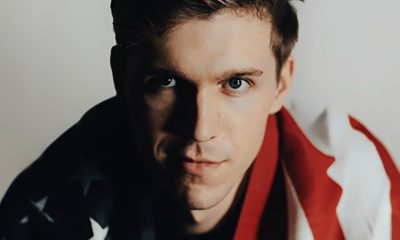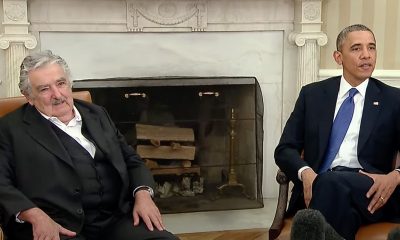Sports
FIFA seeks to combat homophobia in soccer
Chile, Mexico among countries fined for anti-gay fans

‘Sport should give us pride and never should come with discrimination,’ said gay Brazilian Congressman Jean Wyllys.
(Photo by Cristina Gallo/Agência Senado; courtesy Wikimedia Commons)
Homophobia remains a serious problem in global soccer in spite of FIFA’s efforts to fight it.
Article 67 of FIFA’s Disciplinary Code states “the home association or home club is liable for improper conduct among spectators, regardless of the question of culpable conduct or culpable oversight, and, depending on the situation, may be fined.” The provision also says “the visiting association or visiting club is liable for improper conduct among its own group of spectators, regardless of the question of culpable conduct or culpable oversight, and, depending on the situation, maybe fined.”
“Improper conduct includes violence towards persons or objects, letting off incendiary devices, throwing missiles, displaying insulting or political slogans in any form, uttering insulting words or sounds, or invading the pitch,” reads Article 67.
Article 67 does not specifically include sexual orientation, but FIFA has used it to sanction countries over their fans’ anti-gay conduct.
FIFA since 2015 has fined Chile 180,000 Swiss francs ($187,149) for “homophobic chants by supporters” and “improper conduct among spectators” that included “homophobic chants” and “homophobic and insulting chants.” Three of the nine incidents that prompted FIFA to fine the South American country also resulted in banning matches at the National Stadium in Santiago.
FIFA imposed a one-game ban on official matches at the Metropolitan Olympic Stadium in San Pedro Sula, Honduras, and fined the country 40,000 Swiss francs ($41,589) after fans shouted “homophobic chants” and threw water bottles during a Nov. 11, 2016, game against Panama.
FIFA since November 2015 has fined Mexico 130,000 Swiss francs ($135,163) for “homophobic chants” among its supporters during matches against the U.S., El Salvador, Canada, Honduras, Panama and Costa Rica.
Mexican soccer fans routinely taunt an opposing team’s goalkeeper by chanting “puto,” which roughly translates as “faggot” in English.
FIFA on June 20 issued a warning to Mexico after fans used the homophobic chant during a pre-2018 World Cup match that took place in Russia. The Mexican Football Association subsequently warned its fans to stop using the chant.
“As you know, FIFA is very serious about the chanting that we do when the goalkeeper takes a kick, and the possible sanctions are serious,” it said in a statement, according to NBC News. “Our efforts on the pitch will come to nothing if, because of this (behavior), we lose the match, the game is suspended or you are expelled from the stadium.”
“We lose, you lose, everyone loses,” added the Mexican Football Association.
FIFA since 2015 has also fined Argentina, Brazil, Colombia, El Salvador, Greece, Panama, Paraguay, Peru and Uruguay for “homophobic chants by supporters” during matches.
FIFA rules specifically ban discrimination based on sexual orientation and gender, but the organization awarded the 2018 World Cup to Russia in spite of the country’s LGBT rights record. A FIFA spokesperson told the Washington Blade the organization has a gay-inclusive “comprehensive strategy to combat discrimination” that includes a guide on how to promote diversity and fight discrimination.
“FIFA is committed to fighting all forms of discrimination in football, including homophobia,” said the spokesperson. “The sanctions related to homophobic chants applied around the FIFA World Cup qualifiers are proof of how seriously FIFA takes this issue.”
LGBT advocacy groups in Latin America have launched campaigns that are designed to combat homophobia in soccer.
The LGBT Federation of Argentina launched a campaign ahead of the 2014 World Cup in Brazil that featured retired soccer player Sergio Govcochea and Argentine sports reporter Juan Manuel Varela. The campaign, which incorporates FIFA’s Fair Play initiative, also featured clips of fans using homophobic and racist chants to taunt players from opposing teams during games.
“We believe in the value of Fair Play that FIFA launched years ago,” then-LGBT Federation of Argentina President Esteban Paulón in a statement that launched the campaign. “It has to leave the fields and reach the fans and also strongly fight against discrimination — not only against lesbians, gays, bisexuals and trans people — in the stands.”
GLAAD, Google and YouTube also launched campaigns during the 2014 World Cup that promoted LGBT acceptance in soccer and other sports.
“Sport should give us pride and never should come with discrimination or exclusion; regardless of ethnicity, social status, gender, sexual orientation or any other type (of factor,)” said gay Brazilian Congressman Jean de Wyllys in Google’s “Play with Pride” campaign.
Chile’s National Association of Professional Soccer last October signed an agreement with the Movement for Homosexual Integration and Liberation, an LGBT advocacy group, in which it pledged to fight homophobia and other forms of discrimination in professional soccer.
The two groups earlier this year launched a campaign to combat homophobic, racist and xenophobic chants in the country’s soccer stadiums. The Movement for Homosexual Integration and Liberation in a March 29 press release applauded fans for their “good and respectful behavior” during a game between Chile and Venezuela that took place the day before at Monumental Stadium in the Santiago suburb of Macul.
“We did not hear, nor were we aware of any xenophobic, homophobic or racist chants or shouts, even during the second half when the Chilean team was in a tense moment,” said the Movement for the Homosexual Integration and Liberation. “What happened yesterday was, without doubt, an advance for respect and pacifism that we hope will continue.”
Sports
US wins Olympic gold medal in women’s hockey
Team captain Hilary Knight proposed to girlfriend on Wednesday

The U.S. women’s hockey team on Thursday won a gold medal at the Milan Cortina Winter Olympics.
Team USA defeated Canada 2-1 in overtime. The game took place a day after Team USA captain Hilary Knight proposed to her girlfriend, Brittany Bowe, an Olympic speed skater.
Cayla Barnes and Alex Carpenter — Knight’s teammates — are also LGBTQ. They are among the more than 40 openly LGBTQ athletes who are competing in the games.
The Olympics will end on Sunday.
Sports
Attitude! French ice dancers nail ‘Vogue’ routine
Cizeron and Fournier Beaudry strike a pose in memorable Olympics performance

Madonna’s presence is being felt at the Olympic Games in Italy.
Guillaume Cizeron and his rhythm ice dancing partner Laurence Fournier Beaudry of France performed a flawless skate to Madonna’s “Vogue” and “Rescue Me” on Monday.
The duo scored an impressive 90.18 for their effort, the best score of the night.
“We’ve been working hard the whole season to get over 90, so it was nice to see the score on the screen,” Fournier Beaudry told Olympics.com. “But first of all, just coming out off the ice, we were very happy about what we delivered and the pleasure we had out there. With the energy of the crowd, it was really amazing.”
Watch the routine on YouTube here.
Italy
Olympics Pride House ‘really important for the community’
Italy lags behind other European countries in terms of LGBTQ rights

The four Italian advocacy groups behind the Milan Cortina Winter Olympics’ Pride House hope to use the games to highlight the lack of LGBTQ rights in their country.
Arcigay, CIG Arcigay Milano, Milano Pride, and Pride Sport Milano organized the Pride House that is located in Milan’s MEET Digital Culture Center. The Washington Blade on Feb. 5 interviewed Pride House Project Manager Joseph Naklé.
Naklé in 2020 founded Peacox Basket Milano, Italy’s only LGBTQ basketball team. He also carried the Olympic torch through Milan shortly before he spoke with the Blade. (“Heated Rivalry” stars Hudson Williams and Connor Storrie last month participated in the torch relay in Feltre, a town in Italy’s Veneto region.)
Naklé said the promotion of LGBTQ rights in Italy is “actually our main objective.”
ILGA-Europe in its Rainbow Map 2025 notes same-sex couples lack full marriage rights in Italy, and the country’s hate crimes law does not include sexual orientation or gender identity. Italy does ban discrimination based on sexual orientation in employment, but the country’s nondiscrimination laws do not include gender identity.
ILGA-Europe has made the following recommendations “in order to improve the legal and policy situation of LGBTI people in Italy.”
• Marriage equality for same-sex couples
• Depathologization of trans identities
• Automatic co-parent recognition available for all couples
“We are not really known to be the most openly LGBT-friendly country,” Naklé told the Blade. “That’s why it (Pride House) was really important for the community.”
“We want to use the Olympic games — because there is a big media attention — and we want to use this media attention to raise the voice,” he added.

Naklé noted Pride House will host “talks and roundtables every night” during the games that will focus on a variety of topics that include transgender and nonbinary people in sports and AI. Another will focus on what Naklé described to the Blade as “the importance of political movements now to fight for our rights, especially in places such as Italy or the U.S. where we are going backwards, and not forwards.”
Seven LGBTQ Olympians — Italian swimmer Alex Di Giorgio, Canadian ice dancers Paul Poirier and Kaitlyn Weaver, Canadian figure skater Eric Radford, Spanish figure skater Javier Raya, Scottish ice dancer Lewis Gibson, and Irish field hockey and cricket player Nikki Symmons — are scheduled to participate in Pride House’s Out and Proud event on Feb. 14.
Pride House Los Angeles – West Hollywood representatives are expected to speak at Pride House on Feb. 21.
The event will include a screening of Mariano Furlani’s documentary about Pride House and LGBTQ inclusion in sports. The MiX International LGBTQ+ Film and Queer Culture Festival will screen later this year in Milan. Pride House Los Angeles – West Hollywood is also planning to show the film during the 2028 Summer Olympics.
Naklé also noted Pride House has launched an initiative that allows LGBTQ sports teams to partner with teams whose members are either migrants from African and Islamic countries or people with disabilities.
“The objective is to show that sports is the bridge between these communities,” he said.
Bisexual US skier wins gold
Naklé spoke with the Blade a day before the games opened. The Milan Cortina Winter Olympics will close on Feb. 22.
More than 40 openly LGBTQ athletes are competing in the games.
Breezy Johnson, an American alpine skier who identifies as bisexual, on Sunday won a gold medal in the women’s downhill. Amber Glenn, who identifies as bisexual and pansexual, on the same day helped the U.S. win a gold medal in team figure skating.
Glenn said she received threats on social media after she told reporters during a pre-Olympics press conference that LGBTQ Americans are having a “hard time” with the Trump-Vance administration in the White House. The Associated Press notes Glenn wore a Pride pin on her jacket during Sunday’s medal ceremony.
“I was disappointed because I’ve never had so many people wish me harm before, just for being me and speaking about being decent — human rights and decency,” said Glenn, according to the AP. “So that was really disappointing, and I do think it kind of lowered that excitement for this.”
-

 Baltimore4 days ago
Baltimore4 days ago‘Heated Rivalry’ fandom exposes LGBTQ divide in Baltimore
-

 Real Estate4 days ago
Real Estate4 days agoHome is where the heart is
-

 District of Columbia4 days ago
District of Columbia4 days agoDeon Jones speaks about D.C. Department of Corrections bias lawsuit settlement
-

 European Union4 days ago
European Union4 days agoEuropean Parliament resolution backs ‘full recognition of trans women as women’




















